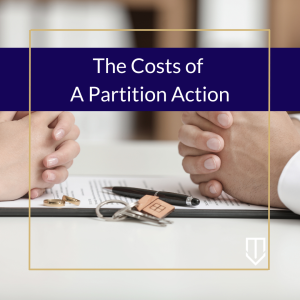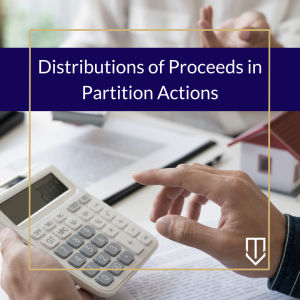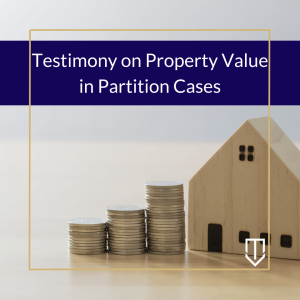 A partition action is the legal process of co-owners dividing a piece of real property. There are various reasons why a partition may be necessary, and different types of partitions exist to ensure the proper remedy is available when these circumstances arise. Co-owners involved in partition actions commonly ask who is responsible for the costs of partition including expenses like attorney fees, surveyor fees, and court costs. The costs of partition are typically divided equitably among co-owners based on their ownership interests. Understanding how the court determines who is responsible for the costs of partition is a crucial part of navigating this complicated legal process.
A partition action is the legal process of co-owners dividing a piece of real property. There are various reasons why a partition may be necessary, and different types of partitions exist to ensure the proper remedy is available when these circumstances arise. Co-owners involved in partition actions commonly ask who is responsible for the costs of partition including expenses like attorney fees, surveyor fees, and court costs. The costs of partition are typically divided equitably among co-owners based on their ownership interests. Understanding how the court determines who is responsible for the costs of partition is a crucial part of navigating this complicated legal process.
What is a Partition Action?
Partition is a legal procedure used to divide property among co-owners, ultimately severing their joint ownership interests and can be done in several ways: Partition in Kind, Partition by Sale, and Partition by Appraisal.
 California Partition Law Blog
California Partition Law Blog


 A trust set up for property gives beneficiaries a right to the property once the settlor has passed away. This means beneficiaries may become co-owners. However, the trustee may also hold an interest in the property as well. If the trustee is a co-owner of the property, they can file a partition suit. This is important if you are interested in filing a partition suit either as a trustee or co-owner of a property where the trustee holds an interest.
A trust set up for property gives beneficiaries a right to the property once the settlor has passed away. This means beneficiaries may become co-owners. However, the trustee may also hold an interest in the property as well. If the trustee is a co-owner of the property, they can file a partition suit. This is important if you are interested in filing a partition suit either as a trustee or co-owner of a property where the trustee holds an interest.  In a
In a  The purpose of this article is to explain whether a property owner can recover value of time or services in a
The purpose of this article is to explain whether a property owner can recover value of time or services in a  The purpose of this article is to explain how a partition action could be brought in federal court. While it is possible to bring a partition action in a federal court, because of how state-specific partition statutes are,
The purpose of this article is to explain how a partition action could be brought in federal court. While it is possible to bring a partition action in a federal court, because of how state-specific partition statutes are,  The purpose of this blog post is to discuss who must be named in a
The purpose of this blog post is to discuss who must be named in a  The purpose of this article is to explain a partition sale and who must be notified of a sale. If the co-owners cannot agree about what to do with a property or whether they want to sell it, a partition action may be necessary. This means forcing the sale of the property to divide the co-owners’ interests in it and divide the value of the property accordingly. Because a home or property cannot necessarily be
The purpose of this article is to explain a partition sale and who must be notified of a sale. If the co-owners cannot agree about what to do with a property or whether they want to sell it, a partition action may be necessary. This means forcing the sale of the property to divide the co-owners’ interests in it and divide the value of the property accordingly. Because a home or property cannot necessarily be  In every lawsuit, one of the biggest consideration is the cost. Frequently, clients are very eager to understand the amount that they will be required to pay to have their case resolved. After all, most people do not have a pot of money set aside for lawsuits, and are forced to eat into their savings to pay for an attorney to help with their legal problems. Even when attorneys’ fees are available for reimbursement, as they are in a partition action, the question of costs is always a significant question.
In every lawsuit, one of the biggest consideration is the cost. Frequently, clients are very eager to understand the amount that they will be required to pay to have their case resolved. After all, most people do not have a pot of money set aside for lawsuits, and are forced to eat into their savings to pay for an attorney to help with their legal problems. Even when attorneys’ fees are available for reimbursement, as they are in a partition action, the question of costs is always a significant question. Before the owners receive the proceeds from a partition sale, costs and expenses related to the
Before the owners receive the proceeds from a partition sale, costs and expenses related to the  The estimated value of a piece of property can be important for resolving several types of legal disputes. It is crucial when a property owner needs to establish damages when the government interferes with the owner’s property and diminishes its value. Spouses may wish to testify regarding the value of their marital property when it is divided during divorce proceedings. A property owner may also want to testify as to their property’s value to contest a bank’s foreclosure on the property.
The estimated value of a piece of property can be important for resolving several types of legal disputes. It is crucial when a property owner needs to establish damages when the government interferes with the owner’s property and diminishes its value. Spouses may wish to testify regarding the value of their marital property when it is divided during divorce proceedings. A property owner may also want to testify as to their property’s value to contest a bank’s foreclosure on the property.